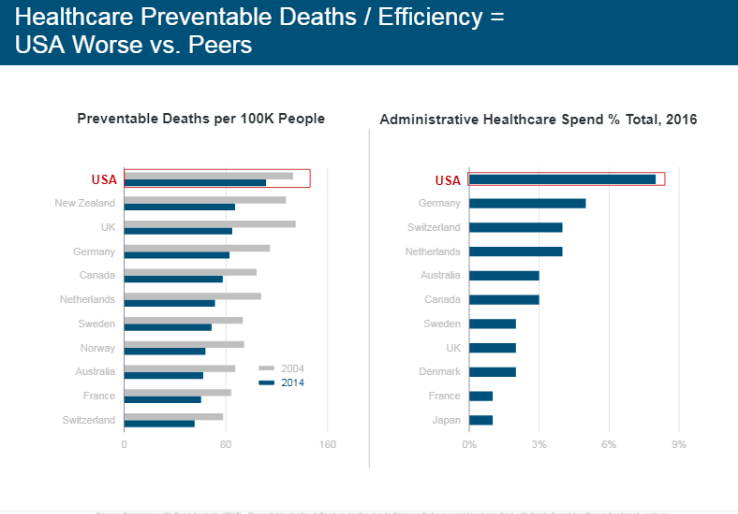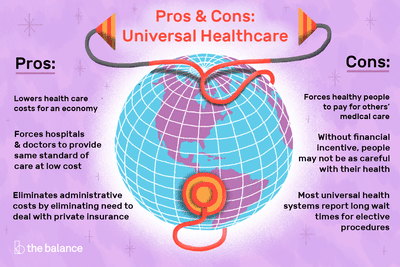Universal Healthcare vs. American Healthcare: Which Is Better?
Universal healthcare sounds like a fairy tale land to Americans. We hear rumors of cheap medical procedures that we are forced to pay thousands for, of countries not affected by the corruption of big pharma, and of citizens who aren’t afraid to call an ambulance. We’ve all seen the push for universal healthcare in politics, but many people think that the main reason America hasn’t adopted universal healthcare is because big pharma companies donate to important government decision makers. While it’s true that big pharma has become a major influencer in politics, they might not be the only reason we haven’t changed the way our health coverage works.
Many of us might think that a universal healthcare plan would fix America’s healthcare, but it’s not that simple. Universal healthcare has its pros but it also has plenty of cons. We’ve heard all the pros before: cheaper costs for the consumer, a healthier community, less competition from healthcare companies, and easier administration processes for doctors.
via ZDNet
But the cons of universal healthcare are issues that not a lot of people bring to attention. Obviously, the big one is that everyone must pay for healthcare that they might not use. According to vittana.org, about 5% of Americans use 50% of health care costs and the healthy 50% of citizens only use about 3%. This can be discouraging for those of us who rarely find ourselves in the doctor’s office. Why should we pay for others to go to the doctor, especially those who are chronically ill?
The next con goes hand in hand with this argument. If those who are chronically ill with a disease that can easily be fixed, such as high blood pressure, don’t have to pay to get care, then there’s no incentive for them to try and get better. If these people are paying next to nothing for some pills that’s going to allow them to get better, why would they do anything to solve their problem? But what about those with illness that they cannot help, such as cancer? Does universal healthcare benefit them more and allow those families to avoid bankruptcy to save their child? Would we feel comfortable paying for health care that we aren’t using if it helps sick children?
via The Balance
Another con of universal healthcare is something similar that happens when you get a court appointed attorney. With universal healthcare providing care to every single citizen, doctors can easily get overwhelmed. This results in long wait times to see a doctor for an issue that isn’t an emergency and when you do get to that doctor, that person may just be looking for the fastest solution to your problem because that doctor might have 20 other patients to see after you. That doctor also might not have the correct technologies to help you. In the UK, for example, the government not only covers healthcare costs but also owns all hospitals and employs all medical professionals. Try as it might, the government can’t always provide the best and newest technology in every single hospital in the country, so while some hospitals and doctors have adequate access to new technology, other hospitals might be severely lacking.
Some countries such as Denmark, France, Australia, Ireland, Hong Kong, Singapore, and Israel have what’s called a two-tier healthcare system. This allows individuals to supplement their universal healthcare with a private insurance for a more in depth coverage. While this coverage is optional, this could cause some families to pay more than others to get the care they need. Some families don’t get the care they need from minimal government healthcare systems, so they are forced to supplement. This means they are forced to not only pay for the universal healthcare but also their private one.
When you compare universal healthcare to the system that America has in place, you can see that America’s system solves some problems that universal healthcare poses. But how can you know which one is better? Sure, we have many pros to our system. We can choose our doctors, many of whom specialize in very specific fields; there is very minimal wait time for any procedure we’d like to have done; and if you choose to pay, you can have the most advanced healthcare in the world.
Of course, many of these pros also stimulate cons for those who can’t afford healthcare. According to an article from verywellhealth.com, in 2016 28.1 million Americans were uninsured. America continues to have the highest cost of healthcare which forces many people to go uninsured, meaning when they do have a medical issue that must be resolved, that person must pay even more in medical costs than they would have paid for insurance.
America is the only country where the medical field is a high-paying competitive field. If a doctor in America were to move to any other country, that person would receive a salary decrease.
via MD Edge
The American healthcare system is just a merry-go-round of corruption as well. Many big pharmaceutical companies produce and promote drugs that can get Americans addicted and then that company turns around and produces the anecdote to the initial drug. These companies refuse to fund research for any alternative solutions because that means less profit. Two very good examples of this is insulin and the opioid epidemic. Insulin has no cap on how much it costs and it’s a lifesaving drug and there are plenty of other solutions to curing opioid addiction that big companies refuse to research.
Many of us are well versed in these cons of America’s healthcare system, but I’m not here to tell you which one is better. It’s our job as voters to do our research and find out what works best for our needs and pass that on to our legislature. Another election is coming up in 2020 and while that might seem like a long time away, we all need to start looking at who can help us solve this major problem. Because if we can make leeway in the medical field, then we can solve a lot of other problems associated with it.
I got my information from verywellhealth.com and vittana.org.cover image via esquire



